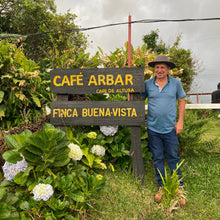
This Special Reserve will be roasted and posted out for the last time on the 26th of November. Limited quantity, when it's gone, that's it!
Orders that contain the Special Reserve will be on hold until the 26th of November.
The cup starts with sweet and floral elderflower cordial, followed by a bright zing mixing crisp green apple with the citrus of lemon and yuzu before softening into a delicate sweetened black tea note on the long aftertaste.
The ARBAR micro-mill is owned by Carlos and Maria Arrieta Soto, The mill name "ARBAR" comes from the combined family names - Carlos ARietta and Maria BARboza - ARBAR, clever eh!
Their family home and the milling area of the mill are right in the middle of the Manantial farm, 1 of the 4 small farms that Carlos and Maria run between them. It’s all laid out immaculately, with the drying beds, depulper, and nursery areas laid out around the edge of the house.
Carlos and Maria are very active members of the local community and have close relationships with their neighbours - which include CoE winning mills like Herbazu, Vista Al Valle and Sumava. The farm operates mostly Organic processes, but they're not Organic certified. They believe in the value of biodiversity on the farms, and plants like fruit trees are positioned among the coffee plants to provide shade and to help the soil. These trees also provide food for the family. They even have a few sheep and other animals, with the farm being as self-sufficient as possible. They have one full-time employee, who lives on the farm.
Before they sold to us, the ARBAR production was sold to a big cooperative. For that, it makes sense to grow tried-and-trusted coffee varieties like Caturra, Catuai, and Villa Sarchi. These are all proven to produce a good cup, and they're relatively resilient and don’t need to be spaced out too much.
When Carlos and his family started selling to us, it gave them a chance to
try new things; the prices that we pay gave them the opportunity to take bigger risks. One of the ways they did this was by trying small plantings of new varietals including Bourbon, Kenya (SL28), and this one – Geisha.
The coffee plants' low yielding, thin, and spindly branches mean they are vulnerable to the strong winds that are common at higher altitudes. To help protect the plants, they’re surrounded by tall trees and kept in the lee of the hill, where they can grow freely. Furthermore, it's about as pest-friendly as a coffee tree comes (although resistant to leaf rust!), so you just don't get much production. But what you do get is pure deliciousness.
- Country: Costa Rica
- Region: Western Valley
- City: Lourdes de Naranjo
- Producer: Carlos Arrieta & Family
- Micromill: ARBAR
- Altitude: 1,600 m.a.s.l.
- Varietal: Geisha
- Process: Honey
- FILTER RECIPE
- Suggested method: Inverted AeroPress
Dry dose: 14g
Water: 200g / 95°C
Time: 3 mins
ESPRESSO RECIPE - Dry dose: 17.5g
Time: 28-30 sec
Wet weight: 36g
We omniroast our beans to suit any brew method. To find the method that suits your kit, check out our Brew Guides.

This coffee has been processed at the ARBAR micromill using the White Honey process. Honey processing is somewhat similar to a Pulped Natural (but uses less water), falling somewhere in between a Washed and a Natural coffee both in terms of contact between the cherry mucilage and the bean during drying time and in the resulting flavour profile. The outer skin and fruit pulp is removed from the seed (bean) of the coffee inside, and it's left to dry.
The colour in the name refers to the amount of sticky fruit that's left on the surface of the seed after depulping - darker indicates more / lighter indicates less. This method can present some risk of over fermentation during processing but water is a precious commodity in this area of Costa Rica, so this method suits the location very well. Carlos definitely has the skills to pay the bills though so no worries about mucking up the Honeys at ARBAR!










